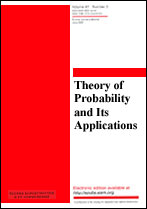|
|
Teoriya Veroyatnostei i ee Primeneniya, 1957, Volume 2, Issue 1, Pages 60–91
(Mi tvp4958)
|
 |
|
 |
This article is cited in 18 scientific papers (total in 18 papers)
On the Linear Extrapolation of a Continuous Homogeneous Random Field
Chiang Tse-Pei
Pekin
Abstract:
An homogeneous random field is defined to be a family of random variables $x(s,t)$, $-\infty<s<\infty,-\infty<t< \infty$, such that
$$\mathbf M[x({s,t})]\equiv0,\lim_{\substack{h_1\to 0\\h_2\to0}}\mathbf M\left[x\left(s+h_1,t+h_2\right)-x(s,t)\right]^2=0$$
and that $B_x(s,t)=\mathbf M[x(s+m,t+n)x\overline{(m,n)}]$ exists and is independent of $m$ and $n$.
In the present paper, the extrapolation problem consists in determining the best linear prediction for the value of the field at any point in the upper half-plane by values at points in the entire lower half-plane. Various types of homogeneous random fields (singular fields, regular fields and fields of Markov type) are considered from the point of view of extrapolation theory. Necessary and sufficient conditions for these types of random fields are given in terms of spectral functions of the field. An expression for the mean square error of the optimum prediction is also obtained.
Received: 29.10.1956
Citation:
Chiang Tse-Pei, “On the Linear Extrapolation of a Continuous Homogeneous Random Field”, Teor. Veroyatnost. i Primenen., 2:1 (1957), 60–91; Theory Probab. Appl., 2:1 (1957), 58–89
Linking options:
https://www.mathnet.ru/eng/tvp4958 https://www.mathnet.ru/eng/tvp/v2/i1/p60
|


|




 Contact us:
Contact us: Terms of Use
Terms of Use
 Registration to the website
Registration to the website Logotypes
Logotypes








 Citation in format
Citation in format 
